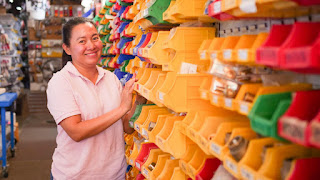Samille Mitchell
ABC Midwest & Wheatbelt
March 12, 2022
Follow a road train roaring out of Perth en route to the resource-laden north and after a few hours you'll come across the township of Dalwallinu.
At first glance it looks like a typical Wheatbelt township – surrounded by brown paddocks and wildflowers in spring, with a wide main street and a historic country pub.
But look a little closer and you'll start to realise "Dally", as the local call it, is different.
For, alongside the humble country homes sit swanky residences that would not be out of place in Perth's posher suburbs.
The main street is livelier, residential subdivisions are being snapped up, and the industrial area is home to flourishing industrial businesses employing hundreds of staff.
While the latest census figures are yet to be released, the most recent figures show Dally's population increased by almost 13 per cent from 2011 to 2016.
And the shire president believes the population has grown further.
So what's the town's secret? Why is it flourishing while towns around it face shrinking and ageing populations?
The answers vary, but they pretty much involve a combination of a wealthy religious group — "the Brethren" — migrant workers and a farming community that mostly welcomes both.
The Exclusive Brethren is a Christian sect that split from the Church of England in the early 1800s and has established itself in rural communities across Australia and the world.
The Brethren are no strangers to controversy, condemned for a tendency to harshly excommunicate and isolate those who fall foul of its practices and beliefs, as Four Corners has reported.
But their communities can also benefit from the economic activity generated by the Brethren, who are mostly tolerated and even welcomed in Dally for the jobs and skilled tradespeople they bring.
Housing struggling to keep up
Dalwallinu Shire President Keith Carter, who says he is not a Brethren follower, reckons he's lucky compared to other shire leaders.
"I've been on council for 11 years now and it wasn't until I came on council that I realised how lucky Dalwallinu is and how our problems are almost the inverse of other towns," Cr Carter said.
Rather than lamenting dwindling populations like other rural townships, Cr Carter's headaches come from trying to create enough housing for a growing population.
"We developed 13 blocks and I think five of them sold in about the first week," he said.
The rest, he said, were snapped up in a year.
Cr Carter put the town's success largely down to jobs offered by enterprises run by members of the Brethren.
Between them, a handful of mostly Brethren-run engineering, concrete, mining and plastic production companies employ hundreds of staff in Dally.
"The beauty of that is that we can have tradespeople move to town and even when farms have drought or financial constraints the tradespeople can still be assured that they'll get flow-on work from all the industries," Mr Carter said.
"And then you've got the general multiplier effect that also flows through into the local stores."
Brethren welcome migrants
Kim Ray is part of the Brethren community. He was born and bred in Dalwallinu and raised his six sons on the family farm. But when a future in farming looked bleak, his family opened a mine-site engineering company.
Today that business employs 50 people.
"We shifted into engineering and therefore we've built infrastructure in town," Mr Ray said.
"The boys have all built houses in town and there are other families that have done the same."
Mr Ray puts Dalwallinu's success down the number of long-term families who have invested in the town, its location between the agricultural region and the mining region, and the migrant workers that fill employment vacancies.
"The skilled visa has made business here possible," Mr Ray said.
"That meant that some migrants came and quite a lot of them are now permanent residents and we are now employing a large percentage of their children.
"I say it's a win-win — it's a win for us, it's a win for them and it's a win for the shire and the town."
Lucky country
Many of those migrants are from the Philippines and arrived under a Regional Repopulation Plan which offered English language classes, cultural events, and other incentives to migrants.
Marketing expert Manu Ofianza is one of the non-Brethren migrants who has taken up work with a Brethren-owned business. He moved to Dally on a 457 visa, his wife has joined him and soon they plan to welcome their kids to the community.
Mr Ofianza works as a DJ in his spare time and also runs a side hustle as a sound engineer.
"Dalwallinu is a good place and the first thing I notice is people are very courteous — here every vehicle that you encounter the driver will definitely wave his hands to say hi," Mr Ofianza said.
"We really improved our life when we started living here in terms of financials – we really have good savings now compared to when we were living in the Philippines.
"And I think it is a great place to raise a family."
Philippines-born Geraldine Vergara, who is also not part of the Brethren community, agrees. While she initially found the quiet lifestyle a shock after following her husband to Dalwallinu in 2014, she says her two boys love it.
Both of her sons play Aussie rules footy and relish the laid-back lifestyle.
"In the Philippines, for one day's work we can buy food for that day but here for one day's work you can buy food for the whole week," Ms Vergara said.
https://www.abc.net.au/news/2022-03-13/exclusive-brethren-regional-jobs-housing-migration-dalwallinu-wa/100891690


No comments:
Post a Comment